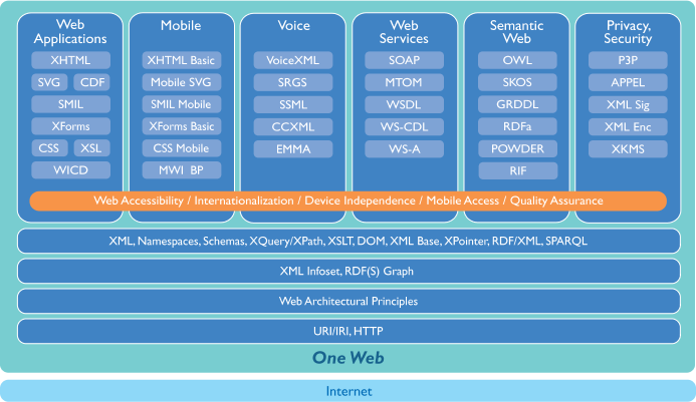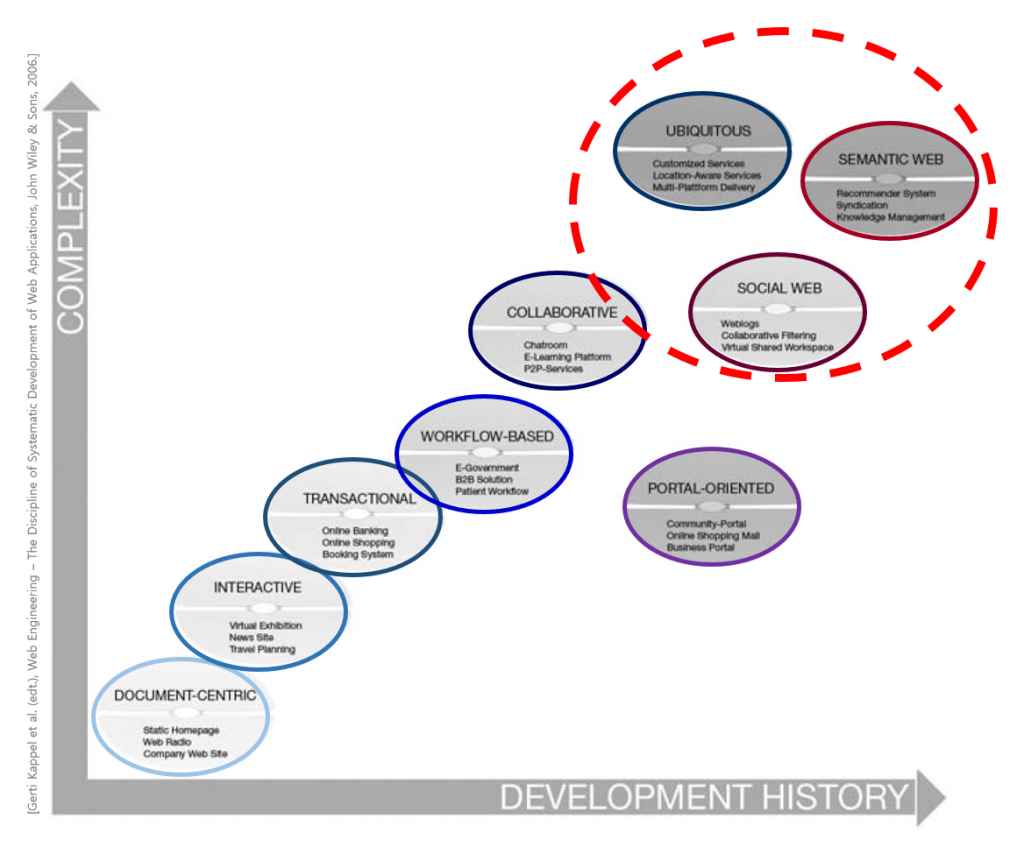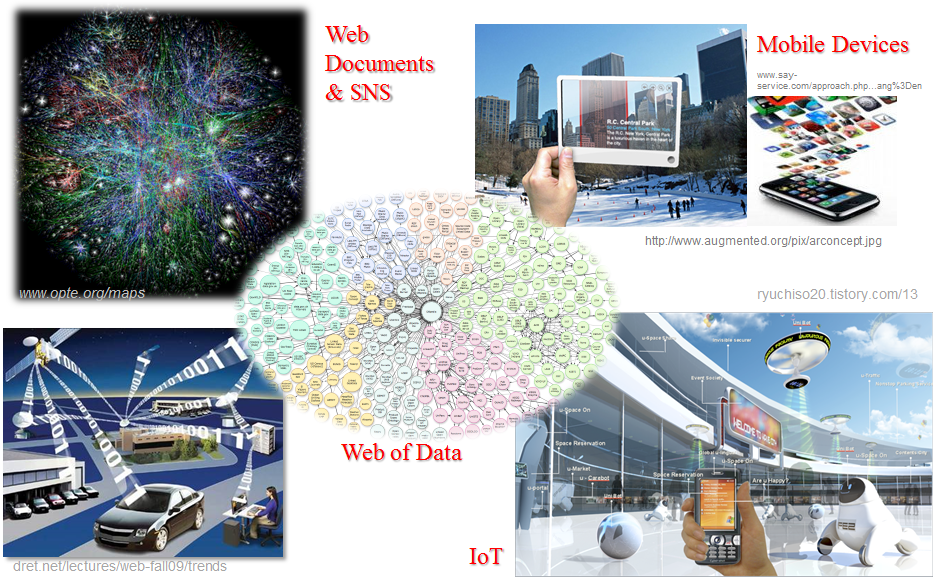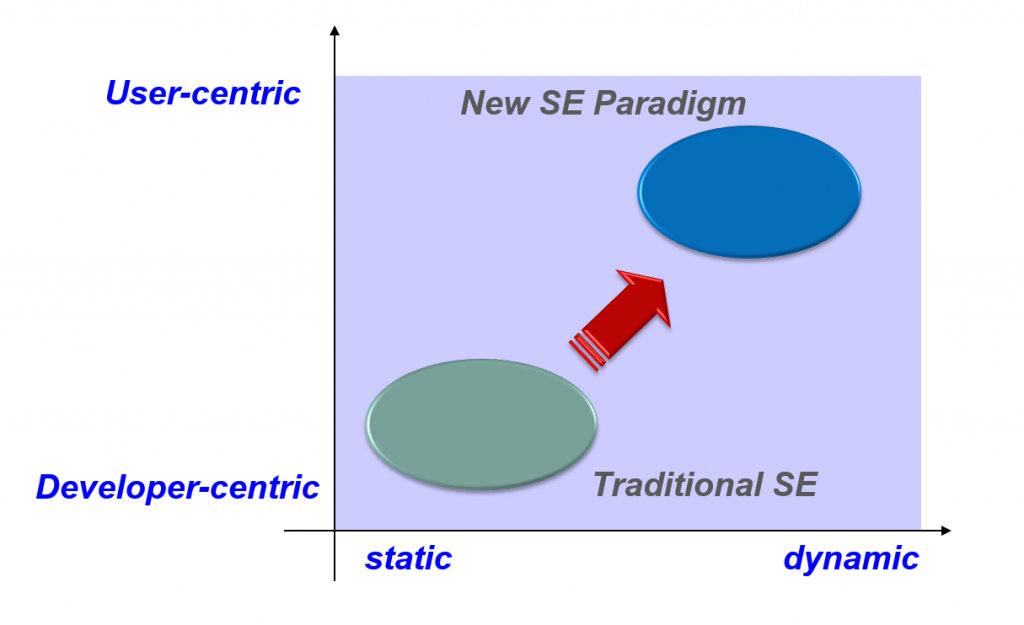Research:
WE are working on software engineering issues of building software systems that effectively utilize various resources in emerging environments such as the Web, clouds, Internet of Things (IoT), and Cyber-Physical Systems (CPS). We especially focus on making software systems adaptable to changing needs and conditions in highly dynamic environments, and allowing end users to participate in the evolution of the software.
Research Areas
- Software engineering for dynamic environments
- Adaptive and evolvable software design
- Software design and testing for DevOps and continuous integration
- Knowledge-based software engineering
- End-user software engineering
- Services computing
- Task-oriented service provision for IoT and CPS environments
- Service composition/mashups
- Service-oriented architecture
- Web applications
- Web application testing
- Semantic and mobile Web applications
- Web-based information modeling and management
Detailed Research Topics
- An Efficient Resource Allocation Approach based on a Genetic Algorithm for Composite Services in IoT Environments
- Distributed Service Discovery in Mobile IoT Environments Using Hierarchical Bloom Filters
- Web App/Service Testing
- Collaborative-Filtering-Based Service Recommendations with Multi-Dimensional Contexts in IoT Environments
The Web: A Platform for Software Engineering
- Provides repositories for searching software services
- Provides a medium for deploying software as services
- Supports protocols to access software services
- Supports an environment to dynamically compose (assemble or synthesize) applications
Categories of Web Applications
Spontaneous Service Computing Environments
New Trends
- Web as a Platform
- Mobile Web & “The One Web”
- Internet of Things
- A network of objects
- Internet of Services
- Locating and Accessing Services
- Service Mash-up
- Semantic Web Services
- Urban Computing
- Web 3.0
- Future Internet with its three central pillars “Social Web”, “Semantic Web” and “Service Web” [Christoph Meinel]
Paradigm Shift in Software Development
Main Approaches
- Task-oriented Service Computing
- Enable high-level software design (in multiple abstractions) with primarily considering user tasks
- Support iterative and gradual development
- Improve reusability
- Enable application adaptability
- Enable service-privacy tradeoff
- Dynamic & Adaptive Software Engineering
- Improve correctness and context awareness
- Improve interoperability
- Support semi-automatic composition
- Enable end-user programming (mash-ups)
On-going projects:
- Research Center for Big data Edge Cloud Services (BECS)
- Funded by the Institute of Information & Communications Technology Planning & Evaluation (IITP), Ministry of Science and ICT
- Period: July 1, 2020 – December 31, 2027
-
Development of Dependable and Highly Usable Big Data Platform, and Analysis and Prediction Services Technology in Edge Clouds – Edge clouds are becoming an important computing platform for collecting and processing big data as the low-latency and highly reliable communications technology such as 5G, and Internet of Things (IoT) are developed and deployed. In this project, we are developing technologies for efficiently collecting and processing various types of big data in edge cloud environments in real-time. In addition, we are developing a framework for building big data service applications in a highly reliable and usable manner.
Previous projects:
- Research on an Edge Computing based AI Sercice Platform for Proactive Traffic Safety using Big Data
- Funded by Korea Agency for Infrastructure Technology Advancement (KAIA), Ministry of Land, Infrastructure, and Transportation
- Period: April 1, 2021 – December 31, 2022
- Optimizing Effect Delivery and User Cognition of IoT Services Using Machine Learning and VR Technologies
- Funded by National Science Foundation of Korean
- Period: June 1, 2019 – December 31, 2021
- Development and On-the-fly Verification of System of Systems for Reliable and Intelligent CPS Applications, Funded by National Research Foundation (NRF) of Korea(차세대 정보컴퓨팅 기술개발사업 과제 총괄), Period: September 1, 2017 – December 31, 2020. – The existing software (SW) engineering methodology does not consider the characteristics of cyber-physical systems (CPS) and it is difficult to apply it to the development process of CPS SW. Therefore, we developed a new SW engineering methodology that reflects the characteristics of CPS. CPS is composed of a system of systems with various heterogeneous cyber and physical systems. It is implemented in a variety of physical environments that are difficult to predict. In addition, it is essential to develop CPS SW with ensuring reliability and safety because users are involved directly or indirectly in its execution. Therefore, the main objective of this research is to develop SW technology for the systematic development and operation of reliable and safe intelligent CPS SW and to develop developer-support tools.
- Improving Test-case Quality by Predicting Module Risks, Funded by the Software Center of Samsung Electronics, Period: April 17, 2017 – December 29, 2017
- Autonomously Collaborating IoT Objects for Building Spatial Knowledge, Funded by Institue for Information & Communications Technology Promotion, Period: April 1, 2017 – December 31, 2018
- User-centric Service Provision Using Fog Computing in Widely Distributed Internet of Things Environments, Funded by National Research Foundation of Korea (NRF), Period: June 1, 2016 – May 31, 2019. – We are extending the fog computing concept to a user-centric service provision paradigm. We are developing a service computing framework in which the IoT devices and Web/cloud services that are necessary to perform a user task are formed into a ‘service fog’, and efficiently coordinated to accomplish the task. In addition, we are developing an approach of making a service fog be migrated from one place to another and collaborating with other service fogs to perform a group task.
- Analysis on Technical Health of Software Developers and Development Teams, Funded by Samsung Research, Samsung Electronics, 2018
- Improving Test-case Quality by Predicting Module Risks, Funded by the Software Center of Samsung Electronics, 2017
- Autonomously Collaborating IoT Objects for Building Spatial Knowledge, Funded by Institute for Information & Communications Technology Promotion (IITP), 2017 – 2018
- Development of IoT-based Trustworthy and Smart Home Community Framework, Funded by the Institute for Information & Communications Technology Promotion (IITP), Period: March 1, 2014 – February 28, 2017
- Mission-oriented Service Modeling and Coordination for System-of-Systems, Funded by Agency for Defense Development (ADD), Period: June 25, 2013 – June 24, 2016.
- A Service-based Software Development Framework for Improving Interoperability and Reusability of Unmanned Systems, Funded by Samsung Thales Co., Korea, Period: November 1, 2012 – April 30, 2014.
- Defense Software Component Grid, A project in the Defense Software Research Center (DSRC), Funded by Defense Acquisition Program Administration (DAPA), Ministry of National Defense, Period: June 1, 2006 – December 31, 2014
- Recommendation of Virtual Goods based on User Interests, Funded by Korea Telecom (KT), 2013
- Smart-IoT-based Spontaneous Service Composition, Funded by Korea Communications Commission, Period: March 1, 2011 ~ February 29, 2014 (collaborative work with Prof. Dongman Lee)
- A Service-based Software Development Framework for Improving Interoperability and Reusability of Unmanned Weapon Systems, 2012 – 2014
- Software Component Grid, Funded by Agency for Defense Development (ADD), 2006 – 2014 – The Software Component Grid is an infrastructure that enables developers of defense software to transparently and efficiently share and reuse software components that are developed by different developers for different information systems. The major goal of the project is to enable application developers to develop reliable defense software economically by effectively finding and reusing components that meet their requirements.
- Recommendation of Spontaneous Service Composition for a Cross Social Platform, Funded by Electronics and Telecommunications Research Institute (ETRI), Period: July 1, 2011 ~ January 31, 2012
- Providing Social Media Services with Recognizing Spatial and Social Relationships, Funded by ETRI, Period: March 1, 2010 ~ February 28, 2011
- Urban Computing Middleware, Funded by Ministry of Knowledge Economy, Period: March 1, 2008 ~ February 28, 2010 (collaborative work with Prof. Dongman Lee)
- Web-based Open IPTV, Funded by Ministry of Knowledge Economy, Period: March 1, 2008 ~ February 28, 2011 (collaborative work with Prof. Junkyun Choi)
- Software Product Line Engineering for Reusing Legacy Software Systems, Funded by Samsung Thales Co., Period: December 1, 2007 ~ December 11, 2009
- A Mobile E-Health Platform, Funded by Samsung Electronics Co., Period: July 1, 2005-June 30, 2008 (collaborative work with Prof. Dongsoo Han)
- Self-managed Software Systems for Intelligent Service Robots, A project under the Intelligent Robotics Development Program, one of the 21st Century Frontier R&D Programs funded by the Ministry of Commerce, Industry and Energy of Korea (collaborative work with Sogang University), Period: April 1, 2004 – March 31, 2010
- Active Surroundings, A project under the Ubiquitous Computing Program, Ministry of Information and Communication, Period: July 1, 2005 – December 31, 2008 (collaborative work with Prof. Dongman Lee)




